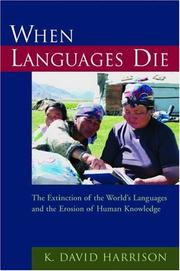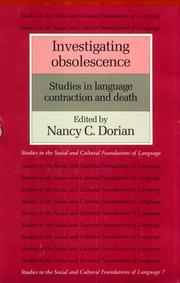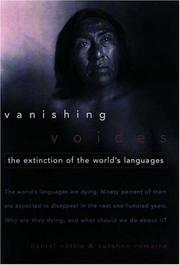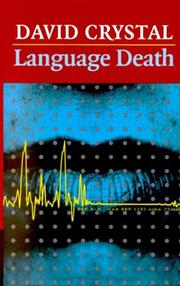| Listing 1 - 10 of 38 | << page >> |
Sort by
|
Book
ISBN: 1282192884 9786612192883 1443809284 9781443809283 9781847180568 1847180566 Year: 2006 Publisher: Newcastle : Cambridge Scholars Press,
Abstract | Keywords | Export | Availability | Bookmark
 Loading...
Loading...Choose an application
- Reference Manager
- EndNote
- RefWorks (Direct export to RefWorks)
This volume is devoted to linguistic and phonetic analysis of some undescribed and endangered languages.
Language obsolescence. --- Language and languages --- Language death --- Obsolescence of languages --- Historical linguistics --- Sociolinguistics --- Endangered languages --- Extinct languages --- Obsolescence
Book
ISBN: 1316120821 1316121917 1316133907 1316129543 1316130630 1316128458 1316132811 1316131726 1139923471 1107431816 1322293376 9781107431812 Year: 2014 Publisher: Cambridge : Cambridge University Press,
Abstract | Keywords | Export | Availability | Bookmark
 Loading...
Loading...Choose an application
- Reference Manager
- EndNote
- RefWorks (Direct export to RefWorks)
The rapid endangerment and death of many minority languages across the world is a matter of widespread concern, not only among linguists and anthropologists but among all concerned with issues of cultural identity in an increasingly globalized culture. By some counts, only 600 of the 6,000 or so languages in the world are 'safe' from the threat of extinction. A leading commentator and popular writer on language issues, David Crystal asks the fundamental question, 'why is language death so important?', reviews the reasons for the current crisis, and investigates what is being done to reduce its impact. This book contains not only intelligent argument, but moving descriptions of the decline and demise of particular languages, and practical advice for anyone interested in pursuing the subject further.
Language obsolescence. --- Language and languages --- Language death --- Obsolescence of languages --- Historical linguistics --- Sociolinguistics --- Endangered languages --- Extinct languages --- Obsolescence --- Language obsolescence

ISBN: 9780195181920 0195181921 0199870624 1429486996 1281162515 9786611162511 0198040172 Year: 2007 Publisher: Oxford Oxford university press
Abstract | Keywords | Export | Availability | Bookmark
 Loading...
Loading...Choose an application
- Reference Manager
- EndNote
- RefWorks (Direct export to RefWorks)
It is commonly agreed by linguists and anthropologists that the majority of languages spoken now around the globe will likely disappear within our lifetime. The phenomenon known as language death has started to accelerate as the world has grown smaller. This extinction of languages, and the knowledge therein, has no parallel in human history. K. David Harrison's book is the first to focus on the essential question, what is lost when a language dies? What forms of knowledge are embedded in a language's structure and vocabulary? And how harmful is it to humanity that such knowledge is lost forever? Harrison spans the globe from Siberia, to North America, to the Himalayas and elsewhere, to look at the human knowledge that is slowly being lost as the languages that express it fade from sight. He uses fascinating anecdotes and portraits of some of these languages' last remaining speakers, in order to demonstrate that this knowledge about ourselves and the world is inherently precious and once gone, will be lost forever. This knowledge is not only our cultural heritage (oral histories, poetry, stories, etc.) but very useful knowledge about plants, animals, the seasons, and other aspects of the natural world--not to mention our understanding of the capacities of the human mind. Harrison's book is a testament not only to the pressing issue of language death, but to the remarkable span of human knowledge and ingenuity. It will fascinate linguists, anthropologists, and general readers.
Language obsolescence. --- Langage et langues --- Disparition --- Linguistics --- Ethnology. Cultural anthropology --- Language obsolescence --- Language and languages --- Language death --- Obsolescence of languages --- Historical linguistics --- Sociolinguistics --- Endangered languages --- Extinct languages --- Obsolescence
Book
ISBN: 9783110521856 3110521857 3110524082 9783110524086 3110521997 9783110521993 Year: 2017 Publisher: Berlin Boston
Abstract | Keywords | Export | Availability | Bookmark
 Loading...
Loading...Choose an application
- Reference Manager
- EndNote
- RefWorks (Direct export to RefWorks)
Research into the “grammar of language death” is often biased toward formal processes (e.g. paradigmatic levelling). In this study the author changes the perspective and shows that the relative susceptibility of linguistic elements to loss, change and innovation in language death circumstances can be dependent on meaning and thus organized along semantic notions rather than along structure.
Modality (Linguistics) --- Grammar, Comparative and general --- Language obsolescence. --- Semantics --- Finnic languages --- Mood. --- History. --- Modality. --- Language obsolescence --- Formal semantics --- Semasiology --- Semiology (Semantics) --- Language and languages --- Language death --- Obsolescence of languages --- Mode (Grammar) --- Mood (Grammar) --- Mood --- History --- Obsolescence --- E-books --- Comparative linguistics --- Information theory --- Lexicology --- Meaning (Psychology) --- Historical linguistics --- Sociolinguistics --- Endangered languages --- Extinct languages --- Linguistics --- Verb --- Philology --- Finnic Languages. --- Language Death.

ISBN: 052132405X 0521437571 0511620993 Year: 1989 Publisher: Cambridge Cambridge University press
Abstract | Keywords | Export | Availability | Bookmark
 Loading...
Loading...Choose an application
- Reference Manager
- EndNote
- RefWorks (Direct export to RefWorks)
Languages die for political, economic and cultural reasons, and can disappear remarkably quickly. Between ten and fifty per cent of all languages currently spoken can be considered endangered, but it is only in the past ten years or so that due importance has been given to the study of contracting and dying languages. This volume represents the first attempt to give a broad overview of current research in a developing field, and to examine some of the crucial methodological and theoretical issues to which it has given rise. It includes twenty studies by scholars who, taken together, have worked on a range of languages currently under threat across the globe. They occur in diverse speech communities where the expanding languages are not only those that are very familiar - English, Spanish, or French, for example - but also Swedish, Arabic, Thai etc. The final part of the volume is devoted to a consideration of the implications of research into language obsolescence for other aspects of linguistics and anthropology - first and second language acquisition, historical linguistics, and the study of pidgins and creoles and of language and social process. As a whole, this collection will certainly stimulate further and better co-ordinated research into a topic of direct relevance to sociolinguistics and anthropological linguistics.
Historical linguistics --- Language obsolescence --- Language and languages --- Language death --- Obsolescence of languages --- Sociolinguistics --- Endangered languages --- Extinct languages --- Obsolescence --- Language obsolescence. --- Historische taalkunde --- Arts and Humanities --- Language & Linguistics --- LANGAGE ET LANGUES --- DISPARITION --- Langues
Book
ISBN: 9783110260014 9783110260021 3110260018 1283402548 9786613402547 3110260026 9781283402545 Year: 2011 Publisher: Berlin De Gruyter Mouton
Abstract | Keywords | Export | Availability | Bookmark
 Loading...
Loading...Choose an application
- Reference Manager
- EndNote
- RefWorks (Direct export to RefWorks)
The rapid decline in the world's linguistic diversity has prompted the emergence of documentary linguistics. While documentary linguistics aims primarily at creating a durable, accessible and comprehensive record of languages, it has also been a driving force in developing language annotation and analysis software, archiving architecture, improved fieldwork methodologies, and new standards in data accountability and accessibility. More recently, researchers have begun to recognize the immense potential available in the archived data as a source for linguistic analysis, so that the field has become of increasing importance for typologists, but also for neighbouring disciplines. The present volume contains contributions by practitioners of language documentation, most of whom have been involved in the Volkswagen Foundation's DoBeS programme (Dokumentation Bedrohter Sprachen). The topics covered in the volume reflect a field that has matured over the last decade and includes both retrospective accounts as well as those that address new challenges: linguistic annotation practice, fieldwork and interaction with speech communities, developments and challenges in archiving digital data, multimedia lexicon applications, corpora from endangered languages as a source for primary-data typology, as well as specific areas of linguistic analysis that are raised in documentary linguistics.
Sociolinguistics --- Endangered languages --- Language obsolescence. --- Langues menacées --- Langage et langues --- Disparition --- Language death --- Obsolescence of languages --- Obsolescence --- Language and languages. --- Language and languages --- Historical linguistics --- Extinct languages --- Foreign languages --- Languages --- Anthropology --- Communication --- Ethnology --- Information theory --- Meaning (Psychology) --- Philology --- Linguistics

ISBN: 0195152468 9780195152463 128047355X 9786610473557 0198031181 1602569142 9780198031185 1423761189 9781423761181 9781602569140 9780195136241 0195136241 9781280473555 6610473552 0190285788 0197722768 9780190285784 Year: 2002 Publisher: Oxford Oxford university press
Abstract | Keywords | Export | Availability | Bookmark
 Loading...
Loading...Choose an application
- Reference Manager
- EndNote
- RefWorks (Direct export to RefWorks)
Approximately half of all known languages have disappeared in the last 500 years. This text for graduate and professional linguists argues that the loss of linguistic diversity is just as threatening as the loss of global biodiversity.
Linguistic demography. --- Language maintenance. --- Language maintenance --- Language loyalty --- Maintenance of language --- Language death --- Obsolescence of languages --- Obsolescence --- Language obsolescence. --- Language and languages --- Sociolinguistics --- Historical linguistics --- Endangered languages --- Extinct languages --- Maintenance --- Areal linguistics.
Multi
ISBN: 9780521882156 9780511975981 9781107552449 9781139081566 113908156X 9781139079280 113907928X 0511975988 9781139077002 1139077007 9781139136181 1139136186 052188215X 1316088278 1139062646 1283112957 9786613112958 113907475X 1139068989 1107552443 9781316088272 9781139062640 9781283112956 661311295X 9781139068987 Year: 2011 Publisher: Cambridge Cambridge University Press
Abstract | Keywords | Export | Availability | Bookmark
 Loading...
Loading...Choose an application
- Reference Manager
- EndNote
- RefWorks (Direct export to RefWorks)
It is generally agreed that about 7,000 languages are spoken across the world today and at least half may no longer be spoken by the end of this century. This state-of-the-art Handbook examines the reasons behind this dramatic loss of linguistic diversity, why it matters, and what can be done to document and support endangered languages. The volume is relevant not only to researchers in language endangerment, language shift and language death, but to anyone interested in the languages and cultures of the world. It is accessible both to specialists and non-specialists: researchers will find cutting-edge contributions from acknowledged experts in their fields, while students, activists and other interested readers will find a wealth of readable yet thorough and up-to-date information.
Language and languages --- Language obsolescence --- Language death --- Obsolescence of languages --- Historical linguistics --- Sociolinguistics --- Endangered languages --- Extinct languages --- Foreign languages --- Languages --- Anthropology --- Communication --- Ethnology --- Information theory --- Meaning (Psychology) --- Philology --- Linguistics --- Obsolescence --- LANGUAGE ARTS & DISCIPLINES / Linguistics / General --- Arts and Humanities --- Language & Linguistics

ISBN: 1107117623 1139106856 0511048386 0511008597 9780511008597 9781139106856 9780511067372 0511067372 9780521012713 0521012716 9780511048388 9781139871549 1139871544 0521653215 9780521653213 0511148968 0511065248 Year: 2000 Publisher: Cambridge Cambridge University Press
Abstract | Keywords | Export | Availability | Bookmark
 Loading...
Loading...Choose an application
- Reference Manager
- EndNote
- RefWorks (Direct export to RefWorks)
The rapid endangerment and death of many minority languages across the world is a matter of widespread concern, not only among linguists and anthropologists but among all concerned with issues of cultural identity in an increasingly globalized culture. By some counts, only 600 of the 6,000 or so languages in the world are 'safe' from the threat of extinction. A leading commentator and popular writer on language issues, David Crystal asks the fundamental question, 'Why is language death so important?', reviews the reasons for the current crisis, and investigates what is being done to reduce its impact. This 2002 book contains not only intelligent argument, but moving descriptions of the decline and demise of particular languages, and practical advice for anyone interested in pursuing the subject further.
Language obsolescence. --- Language and languages --- Language death --- Obsolescence of languages --- Historical linguistics --- Sociolinguistics --- Endangered languages --- Extinct languages --- Obsolescence --- 800 --- 800 Taalwetenschap. Taalkunde. Linguistiek --- Taalwetenschap. Taalkunde. Linguistiek --- Language obsolescence --- Arts and Humanities --- Language & Linguistics --- LANGAGE ET LANGUES --- DISPARITION --- Langues --- Extinct languages.
Book
ISBN: 9027271151 9789027271150 9781306117951 130611795X 9789027206091 9027206090 Year: 2013 Publisher: Amsterdam Philadelphia
Abstract | Keywords | Export | Availability | Bookmark
 Loading...
Loading...Choose an application
- Reference Manager
- EndNote
- RefWorks (Direct export to RefWorks)
Language and languages --- Language obsolescence --- Foreign languages --- Languages --- Anthropology --- Communication --- Ethnology --- Information theory --- Meaning (Psychology) --- Philology --- Linguistics --- Language death --- Obsolescence of languages --- Historical linguistics --- Sociolinguistics --- Endangered languages --- Extinct languages --- Obsolescence
| Listing 1 - 10 of 38 | << page >> |
Sort by
|

 Search
Search Feedback
Feedback About UniCat
About UniCat  Help
Help News
News